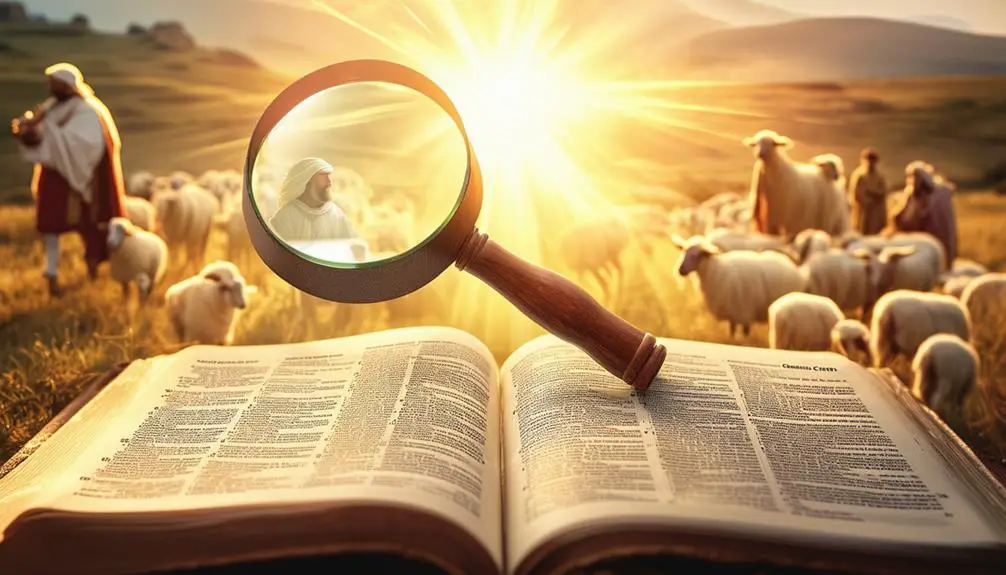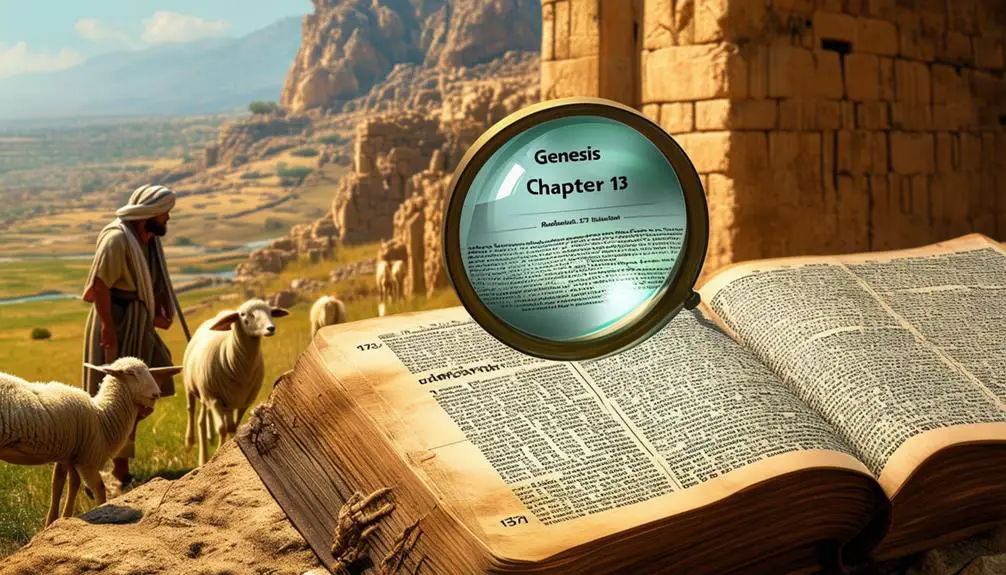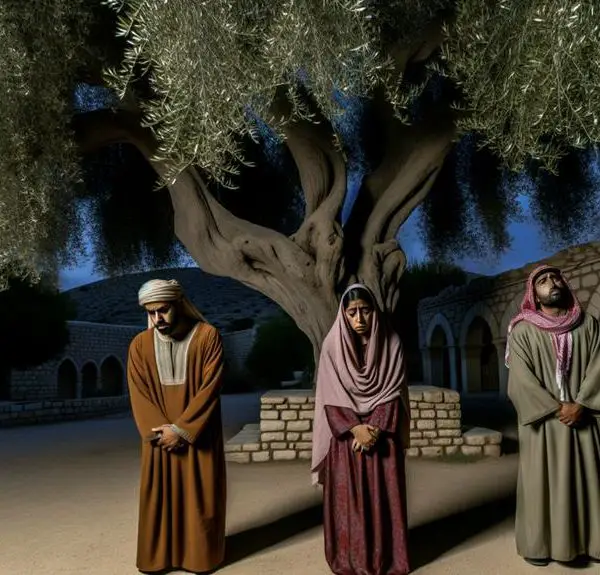Gain insights into Abram and Lot's wealth-driven conflict and divine decision-making in Genesis Chapter 13, unlocking wisdom on managing conflicts.

Bible Study – The Book of Genesis – Chapter 13 – Summary and Analysis
In Genesis Chapter 13, you'll decipher Abram and Lot's relationship mired by wealth-based conflict, culminating in a peaceful separation. You'll witness the importance of Lot's greed-driven choice of the lush Jordan plains, while Abram, guided by God's promise, settling in Canaan. You'll understand Abram's spiritual growth as conflict resolution techniques and divinely-driven decision-making comes to light. By studying their choices, you'll uncover timeless wisdom on managing conflicts. Remember, this is just the tip of the iceberg, if you further explore, you'll unearth profound insights on faith, divine providence, and more nuanced themes.
Key Takeaways
- Genesis 13 focuses on Abram and Lot's conflict due to increasing wealth, leading to Lot's choice of Jordan's plains.
- The chapter presents a remarkably peaceful separation between Abram and Lot, demonstrating Abram's prioritizing of peace and diplomacy.
- Lot's decision to choose Jordan Valley and Abram's settling in Canaan sets their future paths, emphasizing the importance of divine guidance in decisions.
- Canaan land, promised to Abram, symbolizes divine assurance and confirms God's faithfulness to Abraham, contrasting with Egypt's barren land.
- The chapter serves as an archetype for biblical conflict resolution, highlighting the virtues of modesty, patience, and selflessness, and the importance of divine wisdom for harmony.
Genesis Chapter 13 Overview

Jumping straight into Genesis Chapter 13, you'll find it's a significant segment of the Bible where Abram's journey unfolds, offering a profound exploration of faith, conflict, and resolution. Positioned as the 13th chapter in the Book of Genesis, it provides a pivotal turning point in the Genesis context.
In this chapter, you'll see Abram returning to Canaan after a famine-induced sojourn in Egypt. You'll witness Divine intervention as God renews His promise to Abram, solidifying the covenant to make his descendants as numerous as the dust of the earth. The narrative underscores Abram's unwavering faith in God, despite the challenges he faces.
Simultaneously, the chapter portrays a candid view of interpersonal conflict, a common human experience. This is evident in the strife that arises between Abram and Lot's herders over grazing lands. This conflict, however, is not left unresolved. Abram's proposed solution, to part ways with Lot, perhaps serves to deescalate the tension.
Abram and Lot's Relationship
As you turn your focus to the relationship between Abram and Lot in Genesis Chapter 13, you'll notice a significant conflict that arises between the two. It's important to analyze this situation, understanding the dynamics of their relationship, the root causes of their disagreement, and the implications it had on their familial ties. This leads to a pivotal separation, which is a critical turning point in their narrative, shaping their individual paths henceforth.
Abram and Lots Conflict
In the intriguing narrative of Genesis chapter 13, you'll find that Abram and Lot's relationship takes a complex turn, culminating in a conflict that arises from their increasing wealth and prosperity. This conflict manifests itself in several ways, primarily through Lot's greed and Abram's generosity.
- Lot's Greed: He chooses the lush, fertile plains of Jordan, displaying a selfish tendency.
- Abram's Generosity: Despite being the elder, Abram allows Lot to choose first, exemplifying his selfless character.
- Conflict Escalation: Their herdsmen start quarreling due to insufficient resources for the flocks, reflecting the tension between Abram and Lot.
- A Test of Faith: This conflict tests Abram's faith, as he's forced to make a difficult decision for peace.
The conflict signifies a pivotal moment in their relationship and sets the stage for future events.
Peaceful Separation Outcome
Despite the escalating conflict, it's striking that Abram and Lot's separation was remarkably peaceful, showcasing Abram's wisdom and desire for familial harmony. This peaceful coexistence was a result of Abram's magnanimity, who prioritized peace over personal gain. He allowed Lot first choice in the division of land, even though as the elder, he had the right to choose first. This action not only mitigated potential discord but also showed a deep understanding of the value of familial peace. The separation aftermath was devoid of rancor or retaliation, highlighting Abram's diplomatic prowess. His actions also underlined his trust in God's providence. By choosing peace, Abram set a powerful Biblical precedent for resolving conflicts, upholding family ties, and demonstrating faith in divine provision.
The Land Division Decision

Often, you'll find that the decision to divide the land in Genesis Chapter 13 is a pivotal moment that underscores the differing priorities and future paths of Abraham and Lot. This decision is marked by important elements of land ownership and divine guidance.
To provide a detailed analysis, consider the following four elements:
- Land Choice: Lot chooses the fertile land of the Jordan Valley, while Abraham settles in the land of Canaan. You'll notice that their choices reflect their distinct priorities.
- Divine Guidance: Abraham's decision is guided by God's promise, showing a deep reliance on divine guidance. On the contrary, Lot makes his choice based on the visible advantages of the land.
- Future Implications: The division decision sets the stage for the divergent future paths of Abraham and Lot. Abraham's descendants inherit God's promises, while Lot's descendants face challenges and strife.
- Land Ownership: The division underscores the importance of land ownership in this context. It's a symbol of prosperity, security, and divine favor.
This decision, thus, is instrumental in understanding the characters' motivations, choices, and the unfolding narrative in the Book of Genesis.
Importance of the Canaan Land
You'll find that the significance of the Canaan land in Genesis Chapter 13 cannot be overstated, serving as the stage for the unfolding of God's promises to Abraham. Canaan's significance emerges as a pivotal locale, a promised land that epitomizes divine assurance and the fulfillment of God's covenant with Abraham. It's not merely a geographical location, but a symbolic representation of God's commitment to Abraham's descendants.
In this chapter, the land of Canaan is depicted as a fertile and prosperous area, diametrically opposed to the barren land of Egypt that Abraham had just left. This stark contrast serves to underline the Promise fulfillment — it is in Canaan where Abraham's descendants will thrive and multiply, not in Egypt.
When we scrutinize the narrative, we see that Canaan is not just a land; it's a divine promise, a future, a destiny. It's a tangible manifestation of faith and obedience to God's command. The importance of the Canaan land lies in its role as a confirmation of God's faithfulness and a physical representation of His promises to Abraham.
Abram's Spiritual Growth

In Genesis Chapter 13, we observe a notable evolution in Abram's spiritual journey, marked by his growing faith and deepening relationship with God. This chapter demonstrates Abram's faithfulness and commitment to his covenant with God, which is an essential aspect of his spiritual transformation.
- Abram's Return to Canaan: Abram's return to Canaan after the famine in Egypt signifies his trust in God's promises, despite the hardships he had faced. His faithfulness is evident in his decision to return to the land God promised him.
- Abram's Generosity: His willingness to let Lot choose the best part of the land demonstrates Abram's humble spirit and his trust in God's providence.
- Abram's Worship: Abram built an altar to God in Hebron, showing his dedication and commitment to God. His spiritual growth can be seen in his consistent practice of worship.
- God's Reassurance: After Lot's departure, God reassured Abram of his promises. This divine reassurance strengthened Abram's faith, underscoring his spiritual transformation.
With each decision he made, Abram's spiritual growth became more evident. His actions reveal a man deeply committed to his faith, a man who trusted God even when circumstances were challenging. This chapter serves as a confirmation of Abram's spiritual growth and faithfulness.
Lot's Choice and Consequences
Contrary to Abram's faith-driven decisions, Lot's choice to dwell in the fertile plains of Jordan, near the wicked city of Sodom, had far-reaching consequences that serve as a stark reminder of the perils of prioritizing worldly gains over spiritual values. Lot's greed, an important factor in this narrative, becomes evident when he chooses the lush, fertile plains, a decision driven by materialism rather than spiritual discernment. This choice leads to his unfortunate entanglement with Sodom's inhabitants, known for their depravity and moral corruption.
Lot's decision, steeped in short-sightedness and self-interest, contrasts starkly with Abram's spiritual decisions, which were guided by divine directives and faith. Lot's choice to align with the worldly and materialistic city of Sodom, hence, symbolizes a deviation from spiritual discernment, a step towards physical prosperity at the cost of spiritual impoverishment.
The repercussions of Lot's choice warn us of the dangers of succumbing to worldly temptations and the importance of grounding our choices in spiritual values. In the grand scheme of Genesis 13, Lot's story serves as a cautionary tale, highlighting the detrimental effects of prioritizing worldly gains over spiritual values.
Conflict Resolution in the Bible

Consider the dispute between Abram and Lot in Genesis 13 as an archetype for biblical conflict management. Reflect upon the actions taken, the outcomes, and how these ancient lessons can inform contemporary understanding of conflict resolution. Your perspective on this may yield fresh insights on the ways the Bible teaches us to handle disagreements and disputes.
Abram and Lot's Dispute
Delving into the heart of Abram and Lot's dispute, you'll find a prime biblical example of conflict resolution, showcasing their decision-making skills in a complex situation. This chapter highlights Lot's greed, and contrasts it with Abram's generosity, providing a moral lesson on humility and selflessness.
- Lot's Greed: Lot chose the fertile land of the Jordan Valley, displaying his greed and short-sightedness.
- Abram's Generosity: In contrast, Abram allowed Lot to choose first, demonstrating generosity and humility.
- The Outcome: Lot's choice led to his eventual downfall, while Abram's generosity was rewarded.
- The Lesson: This narrative teaches us the virtues of modesty, patience, and selflessness.
Therefore, this chapter illuminates the consequences of greed and the rewards of generosity, providing a fascinating study of human character and divine justice.
Biblical Conflict Management
Reflecting on Abram and Lot's dispute, it's evident that the Bible offers insightful strategies for managing conflict. This narrative illustrates two key elements: Divine Intervention and Conflict Escalation. Abram's initiative to resolve the conflict before it escalated demonstrates a keen understanding of the destructive potential of unresolved disagreements. His humble suggestion to Lot to separate their herds for the sake of peace underlines the importance of compromise in conflict resolution. Importantly, his trust in God's divine intervention underscores the significance of faith in managing disputes. Abram's reliance on God's guidance rather than his own understanding can serve as a teachable moment in conflict management, implying that seeking divine wisdom in conflict situations promotes peace and harmony.
Lessons From Genesis 13
Within Genesis 13, you'll find a myriad of lessons on conflict resolution drawn from the experiences of Abram and Lot, highlighting the importance of compromise, humility, and faith in resolving disputes.
Here's a breakdown of these lessons:
- Compromise – Abram's willingness to allow Lot to choose land first demonstrates selflessness and compromise, key factors in resolving conflicts.
- Humility – Despite being the senior, Abram humbly puts Lot's interest before his own, a lesson in humility.
- Divine Guidance – Abram's faith in God's providence guided his decisions, showing the role of divine guidance in conflict resolution.
- Faithful Obedience – Abram's obedience to God, even when it didn't seem beneficial, underscores the importance of faithful obedience in resolving disputes.
These principles provide timeless guidance for conflict resolution, rooted in biblical wisdom.
Key Verses Analysis

In our exploration of key verses, you'll find a wealth of profound insights and narratives that shape the overall context of Genesis Chapter 13. As we investigate the verses interpretation, it's important to understand the biblical context in which they were written. This chapter presents Abram and Lot's separation, a significant event that holds deep spiritual implications.
Abram's generous offer to Lot in verses 8 and 9 showcases his magnanimity and faith in God's providence. This act of selflessness, set against the backdrop of strife, underlines the importance of peace and unity in biblical teachings.
Lot's choice in verse 10, influenced by the lushness of the Jordan Valley, reflects human tendencies towards materialistic allurements. His decision, made without spiritual discernment, becomes a pivotal moment leading to future trials.
In verse 14, God's promise to Abram reaffirms his covenant, a central theme in Genesis. This verse marks a defining moment in Abram's journey, shaping the biblical narrative henceforth.
Through this analysis, you'll begin to see how the key verses in Genesis 13 are interwoven into the broader biblical context. Their interpretation provides unique insights into the character of Abram and Lot, the nature of God's promises, and the consequences of human choices.
Lessons From Genesis 13
As you analyze Genesis Chapter 13, it's vital to ponder the lessons derived from the separation of Abram and Lot. This chapter not only offers insight into prosperity and growth, but also teaches important nuances of conflict resolution. Let's dissect these themes further in order to understand their implications in the biblical narrative as well as their applications in our daily lives.
Abram and Lot's Separation
Delving into Genesis 13, you'll find valuable lessons about Abram and Lot's separation, starting with their decision to part ways due to escalating disputes among their herdsmen. Their split symbolizes two contrasting characters: Lot's greed and Abram's generosity.
- Lot's Greed: Lot chose the fertile Jordan Valley for himself, disregarding the potential consequences of his choice. His decision was influenced by materialistic desires, exemplifying greed.
- Abram's Generosity: Abram, on the other hand, demonstrated generosity. He allowed Lot to choose first, prioritizing peace over material wealth.
- The Consequences: Lot's choice led him towards Sodom, a city synonymous with sin, while Abram stayed in Canaan, the Promised Land.
- The Lesson: The story underscores the peril of greed and the virtue of generosity, reminding us to prioritize relationships and righteousness over materialistic gains.
Prosperity and Conflict Resolution
Upon examining Genesis 13, you'll find it's not just about material prosperity, but also about effective conflict resolution, demonstrating how Abram's wisdom and generosity played pivotal roles in maintaining peace. Abram's immediate action to avert strife is a model of conflict management. You see, despite being the senior, Abram gave Lot the choice of land, manifesting humility and selflessness. This act not only resolved potential conflict but also opened the way for Wealth Blessings. The divine promise of extensive lands and numerous offspring followed Abram's sacrificial decision. This Spiritual Prosperity, a result of peace-keeping and selflessness, underscores that true prosperity isn't confined to material wealth. Hence, Genesis 13 imparts a timeless lesson: resolution of conflicts and pursuit of peace often pave the way for unexpected blessings.
Reflecting on Genesis 13 Themes

In reflecting on the themes found within Genesis 13, you'll notice a profound emphasis on the concepts of faith, obedience, and divine providence. This chapter presents Genesis themes that tackle moral dilemmas, prompting a deeper understanding of Abraham's spiritual journey.
- The theme of faith is illustrated through Abraham's trust in God's promise of prosperity and land. Despite uncertainties, Abraham's faith doesn't waver.
- Obedience surfaces as another significant theme. Abraham's decision to leave Egypt, despite its comforts, displays his obedience to God's directives.
- Genesis 13 also underscores divine providence. God's guidance leads Abraham toward the Promised Land, ensuring his safety and success.
- Finally, moral dilemmas play a significant role. Abraham's decision to let Lot choose his land first showcases his moral integrity, despite the potential for loss.
In essence, Genesis 13 challenges you to contemplate the essence of faith, the value of obedience, the role of divine providence, and the complex nature of moral dilemmas in the face of potential adversity. It's an exploration of Abraham's character and the shaping of his covenant with God.
Frequently Asked Questions
Who Were the Immediate Descendants of Abram and Lot?
Highlighting the significance, Abram and Lot's immediate descendants are worth considering. Abram, displaying leadership qualities, fathered Isaac and Ishmael. Lot, whose decisions had substantial impacts, fathered Moab and Ben-Ammi. Their choices significantly influenced the futures of their offspring, shaping generations to come. Their stories serve as a lesson on the consequences, both positive and negative, of their actions.
What Is the Historical Context of Genesis Chapter 13?
Genesis 13 offers a historical snapshot of Abram and Lot's experiences. You'll see cultural implications in their decision to part ways, reflecting the pastoral nomadic lifestyle of the time. The geographical significance is evident in their choices; Lot chose the fertile Jordan Valley, indicative of the wealth associated with fertile lands. You'll also notice Abram's move to Canaan, a significant region in biblical history.
How Is Genesis Chapter 13 Interpreted in Different Religious Traditions?
In Genesis 13, interpretations vary across religious traditions. In Christianity, it's seen as a affirmation of God's promise to Abraham. Jewish scholars view it as a crucial origin story. For Muslims, it's part of a larger narrative of Prophets. These religious differences highlight the rich tapestry of Genesis interpretations, each lens offering a unique perspective on this seminal chapter. Explore further, and you'll uncover layers of meaning in each tradition's understanding.
Are There Any Archaeological Evidences Supporting Events in Genesis Chapter 13?
While there's no definitive archaeological evidence directly supporting events in Genesis Chapter 13, you can find indirect support. Ancient manuscripts and Genesis architecture suggest a civilization that could align with the Bible's narrative. However, archaeology isn't an exact science and its findings are open to interpretation. So, while you might not find a 'smoking gun,' it doesn't necessarily mean the events didn't occur. It's all about uncovering and piecing together the past's complex puzzle.
How Does Genesis Chapter 13 Influence Christian Ethical Teachings?
Genesis 13 greatly influences Christian ethical teachings. It guides you in handling ethical dilemmas, underscoring the importance of making moral choices. It's a story of conflict resolution, highlighting Christian morality. Abram's decision to part ways with Lot peacefully, despite having the right to choose first, teaches humility and selflessness. This chapter reminds you to prioritize relationships and peace over personal gain, providing a strong foundation for Christian ethics.



Sign up